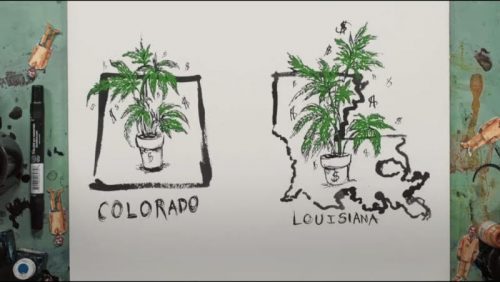“In 1986, when I was coming of age, Ronald Reagan doubled-down on the war on drugs that had been started by Richard Nixon in 1971. Drugs were bad. Fried your brain. And drug dealers were monsters. The sole reason neighborhoods in major cities were failing.”

As rapper-entrepreneur Jay Z carefully begins the narration of a new short film-slash-New York Times op-ed, his confident voice is unmistakable as hand-drawn images bring to life his powerful and harrowing words about America’s failed war on drugs.
“In the 1990s, incarceration rates in the U.S. blew up. Today we imprison more people than any other country in the world. China, Russia, Iran, Cuba — all countries we consider autocratic and repressive.
“Yeah, more than them.”
Via Jay Z’s lyrical text and artist Molly Crabapple’s compelling artwork, the unique visual op-ed puts the drug war’s many casualties into context. As the pro-legalization Drug Policy Alliance’s Asha Bandele writes in the accompanying text:
Other celebrities taking a weed stance & more on the war on drugs
The Game: This famous rapper’s now a co-owner of a California medical marijuana dispensary
Orange County Register op-ed: When it comes to Election 2016, why can’t we mention the war on drugs?
Top Nixon adviser: We invented the war on drugs to vilify blacks, hippies
Weed news and interviews: Get podcasts of The Cannabist Show.
Subscribe to our newsletter here.
Watch The Cannabist Show.
Peruse our Cannabist-themed merchandise (T’s, hats, hoodies) at Cannabist Shop.
The project came about when, last year, Dream Hampton, the filmmaker and a co-author of Jay Z’s book “Decoded,” approached the Drug Policy Alliance about collaborating with Revolve Impact, the social impact agency she works with. Revolve Impact connects artists and influencers to community organizers, and with marijuana legalization taking hold across the nation — and about to be considered in her own state, California — Ms. Hampton wanted to tackle the contradiction raised by Michelle Alexander, the author of “The New Jim Crow: Mass Incarceration in the Age of Colorblindness,” in 2014: Why were white men poised to get rich doing the very same thing that African-American boys and men had long been going to prison for? Ms. Hampton proposed creating an animated video that the D.P.A. would produce about the impact of the drug war in African-American communities.
But it’s Jay Z who is our narrator in the film. And his script cuts to the heart of the issue. A few selections:
“Judges’ hands were tied by tough-on-crime laws, and they were forced to hand out mandatory life sentences for simple possession and low-level drug sales.”
“When the war on drugs began in 1971, our prison population was 200,000. Today it is more than 2 million.”
“There were 1.5 million drug arrests in 2014. More than 80 percent were for possession only. Almost half were for marijuana.”
“If you’re entrepreneurial and live in one of the many states that have passed and legalized laws, you may still face barriers participating in the above-ground economy. Venture capitalists migrate to these states to operate multi-billion dollar operations, but former felons can’t open a dispensary. Lots of times those felonies were drug charges, caught by poor people who sold drugs for a living but are now prohibited from participating in one of the fastest growing economies. Got it?”
Watch the NYT op-ed:
